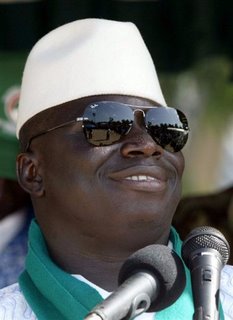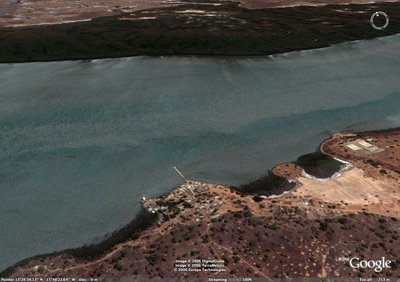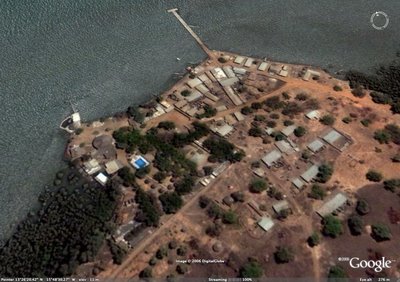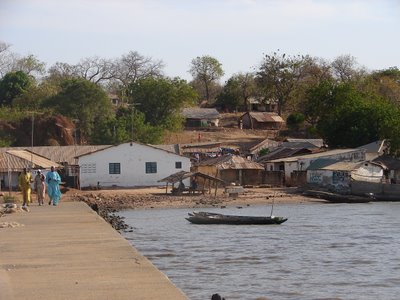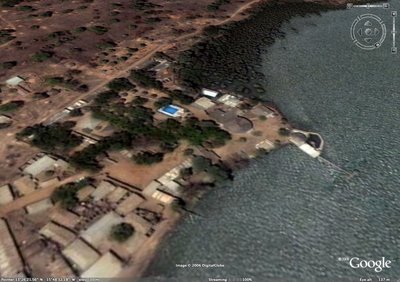
West Africa has produced quite a few world-class authors, but The Gambia doesn’t have a vibrant contemporary literature scene of its own and Gambian fiction is rarely available outside the country. The in-print choice of books about The Gambia is also pretty limited and books about Africa that touch on The Gambia are not much easier to find. A few publications that may be useful to travellers visiting The Gambia, such as the various hand-stapled Mandinka and Wolof language manuals, are sold in hotel shops, at the airport and in Timbooktoo, the country’s only well-stocked bookshop, in Fajara.
Travel and literature
Jens Finke Chasing the Lizard’s Tail: By Bicycle across the Sahara. Entertaining and insightful travelogue, recounting Rough Guide author Finke’s solo journey from Morocco to The Gambia, with vivid descriptions of pre-coup Banjul, where his travels came to an abrupt end.
Mark Hudson Our Grandmothers’ Drums. Rich, absorbing story of the author’s stay in the village of “Dulaba” (Keneba) in the Kiang West area; Hudson immersed himself in traditional rural Gambia by befriending a group of village women, and become an honorary member of their kafo, or working cooperative. Occasionally shaky on anthropology, but frank and revealing on the intricacies of Gambian women’s lives.
Elspeth Huxley Four Guineas. This account of Huxley’s trip through the four Anglophone colonies on the eve of independence is full of credible conversations – and the occasional lapse into racist angst. Probably only available in libraries, or second-hand.
Rosemary Long Under the Baobab Tree; Together Under the Baobab Tree. Cheerful and chatty autobiographical accounts of a Scottish writer’s new life married to a Gambian, running a tourist guesthouse on a shoestring in the Kombos in the early 1990s, with plenty of homespun wisdom about grass-roots Gambia as seen through expat eyes.
Mungo Park Travels into the Interior of Africa. A bestseller in its time, this is the Scottish explorer’s own account of his two journeys in search of the source of the Niger.
Ann-Britt Sternfeldt The Good Tourist in The Gambia. Brief but refreshingly thoughtful and honest guide to responsible tourism in The Gambia, showing how to enjoy the best of the country’s attractions while supporting local businesses and appreciating the natural environment.
Bamba Suso et al Sunjata. The legend of the founder of the Mali empire, which once reached as far as present-day Gambia. The Penguin edition presents two strikingly different Gambian versions of the epic.
History and politics
A.E. Afigbo et al The Making of Modern Africa. A detailed, illustrated guide in two volumes, putting West Africa in the wider African context up until the first big changes after independence.
Adu Boahen Topics in West African History. An excellent introduction to basic themes in West African history by one of Ghana’s most respected historians.
George E. Brooks Landlords and Strangers. The history of West Africa prior to the peak of the colonial era, drawing on oral records and written documentation to trace the significance of climate and inter-cultural communication in the region’s development.
Basil Davidson Africa in History. Lucidly argued and readable summary of Africa’s dominant nineteenth- and twentieth-century events.
Ada Dinkarala et al Historic Sites of The Gambia. Solid background information on topics as diverse as slave-trading, forts, shell-mounds and stone circles.
Cheikh Anta Diop Pre-Colonial Black Africa. Diop asserts that Western civilization had its origins in Africa. First published in the 1950s, this book encouraged a whole generation of students to reinterpret the past from an African perspective.
Harry A. Gailey A History of the Gambia. Published in 1980, and largely superceded by his later Historical Dictionary, but one of the few books available.
Arnold Hughes and David Perfect A Political History of The Gambia, 1816–1994. The history of the country prior to the 1994 coup, focussing on The Gambia’s coming of age as a multiparty democracy.
Arnold Hughes and Harry Gailey Historical Dictionary of The Gambia. Definitive coverage of the country’s history from pre-colonial times to the present, with short biographies of key figures and entries on events, institutions and cultural topics.
Patrick Marnham Dispatches from Africa. Although published in 1980 and now inevitably dated, this journalism remains devastatingly sharp. Includes an essay on The Gambia.
Mungo ParkTravels into the Interior of Africa. Absorbing account of the youthful Scottish explorer’s two journeys (1795 and 1797) along the Niger.
Society and culture
Thomas D. Blakely et al Religion in Africa: Experience & Expression. Thorough examination of religion in Africa and the diaspora.
Simon Broughton et al The Rough Guide to World Music, volume 1: Africa and Middle East. This authoritative work, published in a new third edition in September 2006, discusses the Gambian kora masters in the context of West Africa’s musical heritage, and includes features on Senegambian stars, CD reviews and playlists.
Samuel Charters The Roots of the Blues: An African Search. Charters’ serendipitous journey (The Gambia, Senegal, Mali) aimed to find the blues’ roots in West Africa. While he failed, his other discoveries make great reading.
R.J. Harrison Church West Africa A traditional geography reference – excellent and unexpectedly absorbing.
Thomas A. Hale Griots and Griottes: Masters of Words and Music. A comprehensive look at griots – male and female – of Niger, Mali, Senegal and The Gambia and their roles as historians, genealogists, diplomats, musicians and advisors.
Patience Sonko-Godwin Ethnic Groups of the Senegambia Region. A brief and graspable social history of the region.
David E. Maranz Peace is everything: the world view of Muslims and Traditionalists in Senegambia. A wonderful book, though a dense read, that paints a complex and positive view of Islam. Good, too, on Muslim brotherhoods.
Claudia Zaslavsky Africa Counts: Number and Pattern in African Cultures. Includes a chapter on warri games.
Natural history
Clive Barlow et al Field Guide to the birds of The Gambia and Senegal. Excellent, authoritative bird bible for the region, by a renowned British ornithologist resident in The Gambia.
Stella Brewer The Forest Dwellers. The story of Brewer’s chimpanzee rehabilitation project, now located in the River Gambia National Park.
Jonathan KingdonThe Kingdon Field Guide to African Mammals. Beautifully illustrated, and very detailed, the essential companion for real enthusiasts.
W. Serle and G. Morel A Field Guide to the Birds of West Africa. Comprehensive guide for the whole West African region, with specially commissioned illustrations.
Rod Ward A Birdwatchers’ Guide to The Gambia. Detailed information on some of the country’s prime ornithological sites, accessibly presented.
Silva & Schaltz A Photographic Field Guide to the Birds of the Gambia and West Africa. Excellent pocket guide, with CD-Rom (see www.vogeldocumentatiefonds.nl)
John Willliams A Field Guide to the Butterflies of Africa. Great fun to have with you if you can carry an extra book, though it is fairly selective.
Fiction
T. Coraghessan Boyle Water Music. Lengthy, meticulous – and at times outrageously funny – fictionalization of Mungo Park’s explorations. Boyle’s vision of the West Africa of two centuries ago is utterly captivating: if you take just one book, take this.
William Conton The African. A rags-to-premiership story by a Gambian writer from the colonial era: still a classic, this was a bestseller in 1960s Gambia.
Ebou Dibba Chaff in the Wind; Fafa. This highly accomplished Gambian author, now living in Britain, describes life in 1930s Gambia in
Chaff in the Wind. Fafa is the tale of a remote trading post on the River Gambia.
Alex Haley Roots. An entertaining American saga to read on the beach – only the first few chapters are set in Kunta Kinte’s semi-mythical Gambian homeland, but village life is vividly described.
Lenrie Peters The Second Round. A readable, if downbeat semi-autobiographical account of an African doctor’s experience of culture shock when he returns home after working abroad. This Gambian author has also published several collections of poetry.
Tijan Salleh Kora Land. Verse with an uncompromising take on West African politics and social manoeuvring, from a Gambian poet and essayist who tackles themes such as corruption, poverty and injustice.

 The Gambia has no railway lines, and no internal flights except by private arrangement. The most common way to get around is by road, which is often a slow, dusty and bumpy experience. Travel is severely hampered by the state of the country’s roads. The major artery which runs all the way along the south bank of the River Gambia from Banjul to Basse, via Serrekunda, Brikama, and Soma, was sealed in the 1970s, then neglected so badly that a few stretches (most notoriously the 100km or so west of Soma) are currently a nightmarish mess of potholes. The photo on the left was taken on the north bank, a relatively smooth stretch of dust (or mud, in the rains) between Kerewan and Farafenni.
The Gambia has no railway lines, and no internal flights except by private arrangement. The most common way to get around is by road, which is often a slow, dusty and bumpy experience. Travel is severely hampered by the state of the country’s roads. The major artery which runs all the way along the south bank of the River Gambia from Banjul to Basse, via Serrekunda, Brikama, and Soma, was sealed in the 1970s, then neglected so badly that a few stretches (most notoriously the 100km or so west of Soma) are currently a nightmarish mess of potholes. The photo on the left was taken on the north bank, a relatively smooth stretch of dust (or mud, in the rains) between Kerewan and Farafenni.